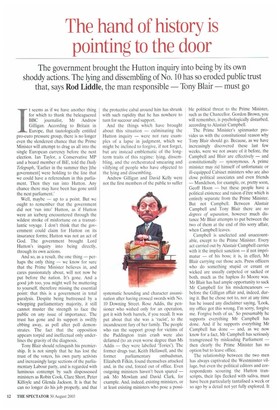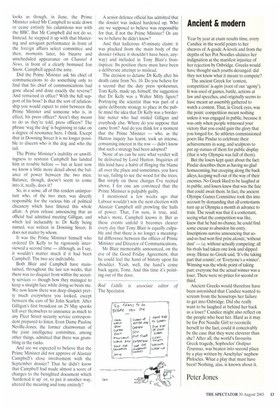The hand of history is pointing to the door
The government brought the Hutton inquiry into being by its own shoddy actions. The lying and dissembling of No. 10 has so eroded public trust that, says Rod Liddle, the man responsible — Tony Blair — must go 1 t seems as if we have another thing for which to thank the beleaguered BBC journalist, Mr Andrew Gilligan. According to Britain in Europe, that tautologically entitled pro-euro pressure group, there is no longer even the slenderest chance that the Prime Minister will attempt to drag us all into the single European currency before the next election. Ian Taylor, a Conservative MP and a board member of BiE, told the Daily Telegraph, 'Earlier in the summer they [the government] were holding to the line that we could have a referendum in this parliament. Then they ran into Hutton. Any chance there may have been has gone until the next parliament.'
Well, maybe — up to a point. But we ought to remember that the government did not 'run into' Hutton, as if Hutton were an iceberg encountered through the wildest stroke of misfortune on a transatlantic voyage. I don't think that the government could claim for Hutton on its insurance forms; Hutton was not an act of God. The government brought Lord Hutton's inquiry into being directly, through its own actions.
And so, as a result, the one thing — perhaps the only thing — we know for sure that the Prime Minister believes in, and cares passionately about, will not now be put before the nation. It's gone. And a good job too, you might well be muttering to yourself, therefore missing the essential point: that this is a government in total paralysis. Despite being buttressed by a whopping parliamentary majority, it still cannot muster the strength to face the public on any issue of importance. The trust has gone and its support is swiftly ebbing away, as poll after poll demonstrates. The fact that the opposition appears torpid and ineffectual only underlines the gravity of the diagnosis.
Tony Blair should relinquish his premiership. It is not simply that he has lost the trust of the voters, his own party activists and increasingly large sections of the parliamentary Labour party, and is regarded with luminous contempt by such dispossessed ministers as Robin Cook, Clare Short, Peter Kilfoyle and Glenda Jackson. It is that he can no longer do his job properly, and that the protective cabal around him has shrunk with such rapidity that he has nowhere to turn for succour and support.
And the things which have brought about this situation — culminating the Hutton inquiry — were not rare examples of a lapse in judgment, which we might be inclined to forgive, if not forget, but are instead emblematic of the longterm traits of this regime: lying, dissembling, and the orchestrated smearing and vilifying of people who have objected to the lying and dissembling.
Andrew Gilligan and David Kelly were not the first members of the public to suffer systematic hounding and character assassination after having crossed swords with No. 10 Downing Street. Rose Addis, the pensioner who wished only for an operation, got it with both barrels, if you recall. It was put about that she was a 'racist', to the incandescent fury of her family. The people who ran the support group for victims of the Paddington train crash were also defamed (to an even worse degree than Ms Addis — they were labelled `Tories'). The former drugs tsar, Keith Hellawell, and the former parliamentary ombudsman, Elizabeth Filkin, found themselves attacked and, in the end, forced out of office. Even outgoing ministers haven't been spared — ask Mo Mowlam and David Clark, for example. And, indeed, existing ministers, or at least existing ministers who pose a possi ble political threat to the Prime Minister, such as the Chancellor. Gordon Brown, you will remember, is psychologically disturbed, according to Alastair Campbell.
The Prime Minister's spinmaster provides us with the constitutional reason why Tony Blair should go. Because, as we have increasingly discovered these last few weeks, were we not aware of it before, the Campbell and Blair are effectively — and constitutionally — synonymous. A prime minister may rid himself of unfortunate or ill-equipped Cabinet ministers who are also close political associates and even friends — Mande!son, for example, or, pretty soon, Geoff Hoon — but these people have a political existence and raison d'être which is entirely separate from the Prime Minister. But not Campbell. Between Alastair Campbell and Tony Blair there are no degrees of separation, however much distance Mr Blair attempts to put between the two of them at the end of this sorry affair, when Campbell leaves.
Campbell is unelected and unaccountable, except to the Prime Minister. Every act carried out by Alastair Campbell carries with it the implicit sanction — if not imprimatur — of his boss; it is, in effect, Mr Blair carrying out those acts. Press officers who do something stupid or errant or wicked are usually carpeted or sacked or both, much as the hapless Jo Moore was. Mr Blair has had ample opportunity to sack Mr Campbell for his misdemeanours — before the Gilligan affair and, indeed, during it. But he chose not to, nor at any time has he issued any disclaimer saying, 'Look, my office got this wrong, I'm sorry, forgive me. Forgive both of us.' So presumably he supports everything Mr Campbell has done. And if he supports everything Mr Campbell has done — and, as we now know for a fact, Mr Campbell has seriously transgressed by misleading Parliament — then clearly the Prime Minister has no option but to leave office.
The relationship between the two men has always captivated the Westminster village, but even the political editors and correspondents scouring the Hutton transcripts, their lips flecked with saliva, must have been particularly tantalised a week or so ago by a detail not yet fully explored. It looks as though, in June, the Prime Minister asked Mr Campbell to scale down or cease entirely his calamitous war with the BBC. But Mr Campbell did not do so. Instead, he stepped it up with that blustering and arrogant performance in front of the foreign affairs select committee and then, moments later, his bizarre and unscheduled appearance on Channel 4 News, in front of a clearly bemused Jon Snow. Campbell upped the ante.
Did the Prime Minister ask his chief of communications to do something only to find that his chief of communications had gone ahead and done exactly the reverse? And remained in office? With the full support of his boss? Is that the sort of relationship you would expect to exist between the Prime Minister and someone who is, in effect, his press officer? Aren't they meant to do as they're told, press officers? The phrase 'wag the dog' is beginning to take on a degree of resonance here, I think. Except that in Downing Street it is no longer possible to discern who is the dog and who the tail.
The Prime Minister's inability or unwillingness to restrain Campbell has landed him in trouble before — but at least now we know a little more detail about the balance of power between the two men. Balance, though, doesn't seem to come into it, really, does it?
So, in a sense, all of this renders unimportant who, of the two men, was directly responsible for the various bits of political chicanery which have littered this whole affair. A press release announcing that an official had admitted meeting Gilligan, and which led ineluctably to Dr Kelly being named, was written in Downing Street. It does not matter by whom.
It was the Prime Minister himself who ordered Dr Kelly to be rigorously interviewed a second time — although, as I say, it wouldn't matter much if it had been Campbell. The two are indivisible.
Both Blair and Campbell have maintained, throughout the last ten weeks, that there was no disquiet from within the security services — though how they managed to keep a straight face while doing so beats me. We now know there was deep disquiet pretty much everywhere you looked, except between the ears of Sir John Scarlett. After Gilligan's first broadcast on 29 May spooks fell over themselves to announce as much to any Fleet Street security service correspondent prepared to listen. Even Dame Pauline Neville-Jones, the former chairwoman of the joint intelligence committee, among other things, admitted that there was grumbling in the ranks.
And are we expected to believe that the Prime Minister did not approve of Alastair Campbell's close involvement with the September dossier? That he didn't know that Campbell had made almost a score of changes to the benighted document which 'hardened it up' or, to put it another way, altered the meaning and tone entirely? A senior defence official has admitted that the dossier was indeed hardened up. Who are we supposed to believe was responsible for that, if not the Prime Minister? Or are we to believe he didn't know?
And that ludicrous 45-minute claim: it was plucked from the main body of the dossier (where it shouldn't have been, anyway) and included in Tony Blair's frontispiece. Its position there must have been a deliberate attempt to mislead.
The decision to defame Dr Kelly after his death came from No. 10. Do you believe for a second that the duty press spokesman, Tom Kelly, made up, himself, the suggestion that Dr Kelly was a Walter Mitty figure? Portraying the scientist thus was part of a quite deliberate strategy to place in the public mind the idea that Dr Kelly was a borderline nutter who had misled Gilligan and everybody else. Where do you suppose that came from? And do you think for a moment that the Prime Minister — who, as the Hutton inquiry has learnt, took an intense, consuming interest in the row — didn't know that such a strategy had been adopted?
None of us can be sure what verdict will be delivered by Lord Hutton. Inquiries of this kind have a habit of flinging the blame all over the place and sometimes, you have to say, failing to see the wood for the trees. But simply on those charges I've recited above. I for one am convinced that the Prime Minister is palpably guilty.
I mentioned a few weeks ago that Labour wouldn't win the next election with Alastair Campbell still prowling the halls of power. That, I'm sure, is true, and, what's more, Campbell knows it. But as these events unfold it becomes clearer every day that Tony Blair is equally culpable and that there is no longer a meaningful difference between the offices of Prime Minister and Director of Communications.
Mr Blair memorably announced, on the eve of the Good Friday Agreement, that he could feel the hand of history upon his shoulder. Yeah, well, the hand's come back again, Tone. And this time it's pointing out of the door.



























































 Previous page
Previous page